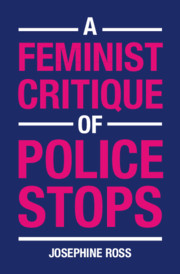Book contents
- Reviews
- A Feminist Critique of Police Stops
- A Feminist Critique of Police Stops
- Copyright page
- Dedication
- Epigraph
- Contents
- Acknowledgments
- Introduction
- Part I Bye, Bye Bill of Rights
- 1 Waive Your Rights: That’s How Stops and Frisks Were Meant to Work
- 2 The Most Dangerous Right: Walking Away from an Officer
- 3 Consenting to Searches: What We Can Learn from Feminist Critiques of Sexual Assault Laws
- 4 Punishing Disrespect: No Free Speech Allowed Here
- 5 Beyond Miranda’s Reach: How Stop-and-Frisk Undermines the Right to Silence
- Part II The Fallout
- Notes
- Index
2 - The Most Dangerous Right: Walking Away from an Officer
from Part I - Bye, Bye Bill of Rights
Published online by Cambridge University Press: 08 December 2020
- Reviews
- A Feminist Critique of Police Stops
- A Feminist Critique of Police Stops
- Copyright page
- Dedication
- Epigraph
- Contents
- Acknowledgments
- Introduction
- Part I Bye, Bye Bill of Rights
- 1 Waive Your Rights: That’s How Stops and Frisks Were Meant to Work
- 2 The Most Dangerous Right: Walking Away from an Officer
- 3 Consenting to Searches: What We Can Learn from Feminist Critiques of Sexual Assault Laws
- 4 Punishing Disrespect: No Free Speech Allowed Here
- 5 Beyond Miranda’s Reach: How Stop-and-Frisk Undermines the Right to Silence
- Part II The Fallout
- Notes
- Index
Summary
When police officers don’t order someone to stay and don’t frisk, civilians are legally allowed to walk away from officers who begin to question them. This right to walk away is pure legal fiction. Although the “free to leave” right is engraved in Supreme Court opinions, my Howard law students warned me that if we taught this during Know Your Rights trainings, we would endanger the teenagers. This legal fiction puts anyone approached by police officers in a lose–lose situation or “double bind.” If we don’t leave, we cannot complain later if it turns out the officer lacked a proper reason for the stop, and any evidence police find will be used against us in court. Yet, running from the police creates a possibility of being shot, and even walking away invites retaliation. We exercise our rights at our peril. Just as judges sometimes ask domestic violence victims “why didn’t you leave?” the Fourth Amendment demands that judges blame civilians for stopping and talking to police. Instead, the law should incorporate insights from the domestic violence advocates; namely, that the people stopped by police are in a better position to know whether it’s safe to leave than judges.
Keywords
- Type
- Chapter
- Information
- A Feminist Critique of Police Stops , pp. 39 - 55Publisher: Cambridge University PressPrint publication year: 2020



